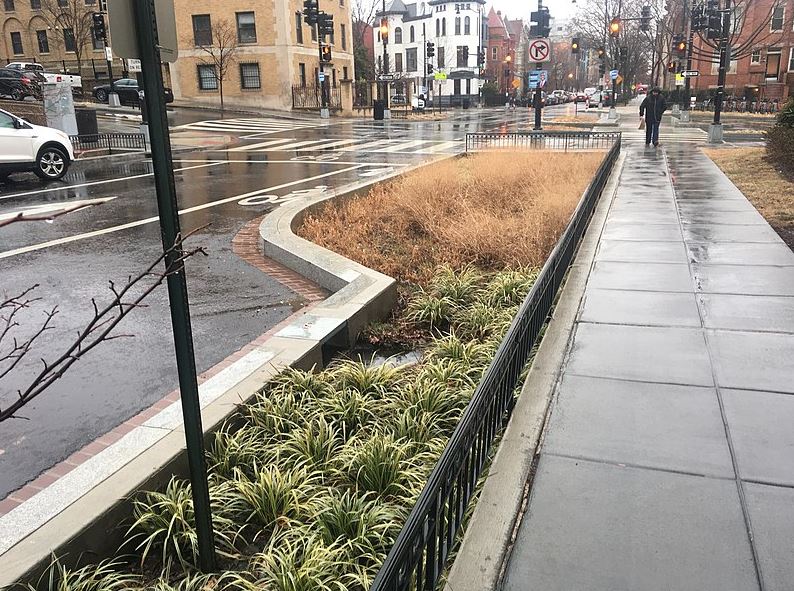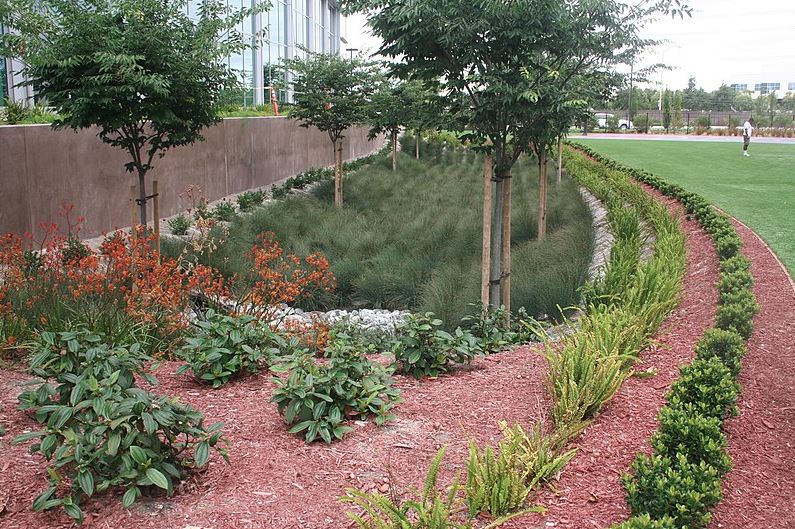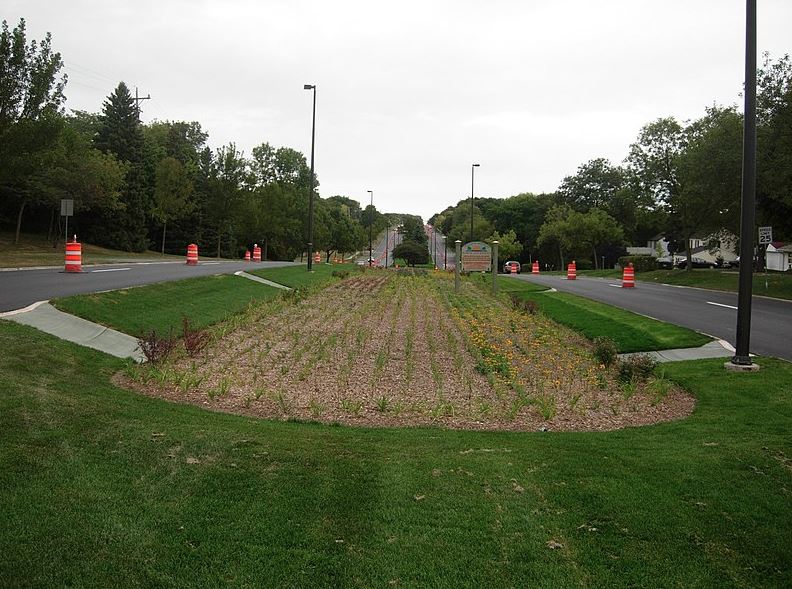Bio-swales are a type of drainage system recommended by the Environmental Protection Agency that can be used to help the environment by reducing polluted stormwater runoff and improving site drainage. These swales have green stormwater infrastructure implemented into their design. They consist of shallow channels filled with vegetation and other materials that will infiltrate stormwater runoff.
Swales are effective erosion control solutions that work by slowing down water moving across the surface and allowing it to soak into the ground. They reduce flooding risk and have additional environmental benefits such as providing habitat for wildlife, encouraging infiltration of pollutants, increasing biodiversity and enhancing aesthetics.

Here’s how, with a small investment in annual maintenance costs, bio-swales can be used to reduce stormwater runoff and improve site drainage while protecting local ecosystems.
Importance of understanding how bio-swales work
A bioswales design is one of the best stormwater management practices. The American Society of Landscape Architects (ASLA) estimates that a 4-meter bioswale can decrease rainfall runoff by about 25%. The capacity of bioswales to naturally filter stormwater during a more common storm event adds to their efficacy.
The environmental protection agency says, “Bioswales are essentially rain gardens placed in long narrow spaces such as the space between the sidewalk and the curb. Bioswales, often found along curbs and in parking lots, use vegetation or mulch to slow and filter stormwater flows.”
The swales are usually defined geometrically with sloped sides and filled with vegetation, as well as rocks or even gravel layers, which offers homes for beneficial organisms while maintaining its filtration capabilities. Every component of the bio-swale needs to be designed accurately in order to prevent erosion and store stormwater runoff.
Accurate construction will help to eliminate weed growth and provide adequate water retention while ultimately managing any pollutants through natural processes like infiltration, adsorption and settling. Furthermore, bio-swales can also be an aesthetically pleasing addition to any residential or commercial site!
The role of vegetation and soil in bio-swales
Bio-swales are an important and integral part of sustainable development and slowing stormwater runoff. They are long, shallow landscape depressions that capture rainwater runoff and naturally manage flooding.
Vegetation plays a key role in bio-swales, as it helps to increase the volume of water that can be infiltrated into the soil. By including a variety of plant species, a polyculture of different types of roots encourage a diverse soil food web and a greater variety of soil microbes than a single species of plants, like those found in grass swales, would be able to support.
The vegetation also slows down the spread of stormwater, providing additional time for sediments to settle and reduce pollutant load. Without soil’s ability to filter and store both surface water and groundwater, the effectiveness of bio-swales would be significantly reduced.
Healthy soil helps to reduce erosion by acting as a cushion between the crop root system and the surface runoff from rainfall events, making vegetation more resilient to erosion forces. Soil provides anchorage for plants to grow by creating macropores which hold water as well as other dissolved contaminants for extended periods of time. Together, vegetated bioswales with diverse plantings as well as grass swales, soil structure and organic matter content play essential roles in bioswale efficiency by reducing sediment accumulation and should be managed properly to ensure their long-term sustainability and water quality benefits.

Do Bio Swales Increase Property Value
Bio swales offer many benefits to homeowners and neighborhoods, but one of the most attractive features is the potential for increasing property values. By capturing rainwater runoff during a storm event onsite rather than allowing it to flow over poorly drained soils and into urban infrastructure, bio swales can improve water quality by increasing the soil infiltration rate. They help reduce the burden on municipal drain systems. This helps prevent flooding and water damage – both of which are costly for cities and individual households alike.
The appeal of these natural-looking water features can help add visual diversity to an outdoor space, often giving it a more luxurious look that potential buyers appreciate. While they provide valuable natural services, vegetated bioswales might have a financial reward as well.
Designing and Installing Bio-Swales
Installing properly designed bioretention areas, sometimes referred to as bio-swales, can play a vital role in the long-term sustainability of cities. A landscape architect is typically responsible for designing effective bio-swale systems. This begins with the layout of the site and careful consideration of soil types, topography, and climate.
Installation requires grading the swale to ensure proper drainage flows while maintaining adequate depth for retention. Incorporation of vegetation and stone helps secure the banks of the swales and promotes absorption rates that are greater than typical lawn grasses can provide alone. When designed and installed correctly, these measures help support a city’s environmental efforts while providing a variety of recreational opportunities at the same time.
Maintenance requirements for bio-swales
Bio-swales provide an important ecological service for urban areas, helping to reduce impacts of runoff and improve water quality and the environment in which we all live. The effectiveness of bio-swales and how much stormwater runoff they can store during a storm event relies on proper maintenance to keep them running efficiently.
This requires regular checks, cleared debris, foliage trimming, and vegetation management. Additionally, they must be annually evaluated by an expert and their design may need to be adjusted over time to ensure peak performance. Fortunately, these maintenance requirements are worth it because of the positive results bio-swales provide to our local communities and ecosystems.
How Expensive Is It To Install Bio-Swales
Installing bio-swales is not always an inexpensive endeavor compared to other stormwater management practices but it is worth every penny. According to the environmental protection agency, investing in green infrastructure makes good business sense. “Green infrastructure is a cost-effective and resilient approach to managing stormwater that can bring many social, economic, public health, and environmental benefits to communities.”
Although the initial cost to install the bioswales can vary greatly depending on their complexity, size and the climate in which they are installed, it is generally accepted that professional installation of a bio-swale can approach thousands of dollars.
Contact Eastcoast Site Work to Install A Bioswale On Your New Jersey Property

Once installed, ongoing maintenance must be conducted in order to ensure that during a common storm event they serve their purpose to improve water quality as effective and efficient stormwater filters. In some cases, reliable municipalities may cover maintenance costs associated with bio-swales, while private homeowners may have to bear those costs out-of-pocket. Despite any potential financial outlays associated with installation and maintenance, the investment is well worthwhile due to the additional benefits provided by a bioswale.
Final Thoughts About How Bio-Swales Help the Environment and Improve Site Drainage
At Eastcoast Site Work, we specialize in providing eco-friendly erosion control solutions, such as building a drainage swale to enhance your property’s appeal and functionality. Our bio-swales are not only an effective way to improve site drainage and water quality but also offer numerous environmental benefits.
A well-designed drainage swale can significantly increase property values with its attractive appearance and luxurious feel, making it an excellent investment for those seeking sustainable alternatives. Bio-swales help reduce stormwater runoff during major storm events, providing relief to overwhelmed urban infrastructure and storm sewer systems.
Our expert team at Eastcoast Site Work can create a customized rain garden that incorporates plant fruit trees to further enrich your landscape and support the local ecosystem. We also offer French drain installation to divert water effectively and manage excess water on your property.
When you choose our bio-swale services, we ensure proper design considerations, implementation of vegetation, and regular checks and trimming of foliage. The excavated soil from the bio-swale construction is repurposed to create a beautiful, functional landscape feature that benefits both your property and the environment.
Experience the advantages of a bio-swale from Eastcoast Site Work and watch your property transform into a sustainable, eco-friendly haven that supports your local community and ecosystem.

